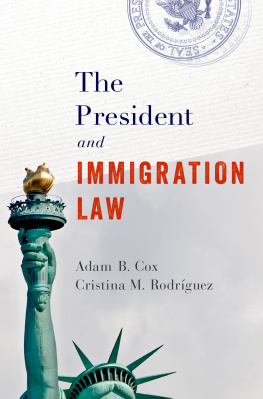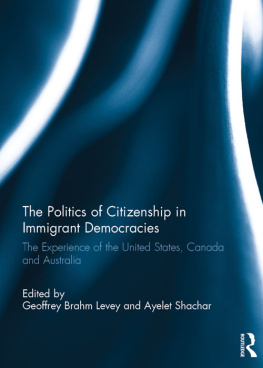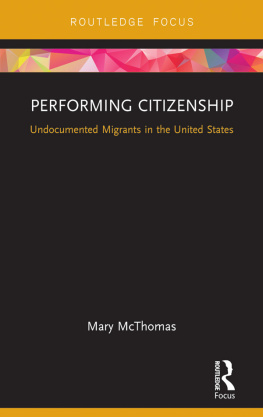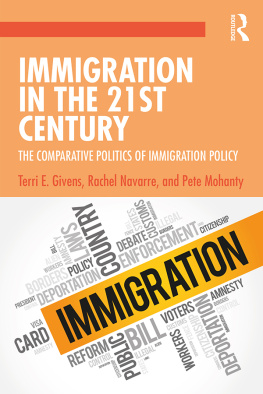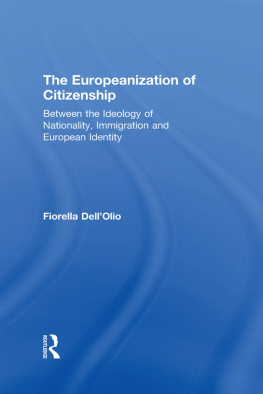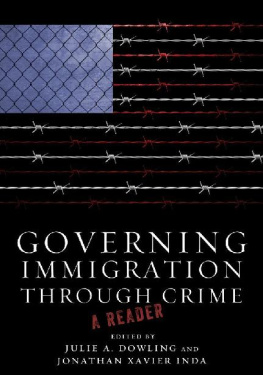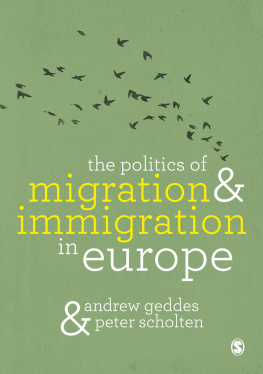Stanford University Press
Stanford, California
2010 by the Board of Trustees of the Leland Stanford Junior University.
All rights reserved.
No part of this book may be reproduced or transmitted in any form or by any means, electronic or mechanical, including photocopying and recording, or in any information storage or retrieval system without the prior written permission of Stanford University Press.
Printed in the United States of America on acid-free, archival-quality paper
Library of Congress Cataloging-in-Publication Data
Raissiguier, Catherine, 1957-
Reinventing the Republic : gender, migration, and citizenship in France / Catherine Raissiguier.
p. cm.
Includes bibliographical references and index.
9780804774611
1. Women illegal aliens--Political activity--France. 2. Women illegal aliens--Legal status, laws, etc.--France. 3. Women immigrants--Political activity--France. 4. Women immigrants--Legal status, laws, etc.--France. 5. France--Emigration and immigration--Political aspects. 6. France--Emigration and immigration--Social aspects. 7. France--Emigration and immigration--Government policy. I. Title.
JV7984.R35 2010
305.4896912--dc22
2010004866
Typeset by Bruce Lundquist in 10/14 Minion
PREFACE
My work on Reiventing the Republic started in the mid-nineties as I watched, from a distance, a group of undocumented immigrants come out of their legal and social obscurity to challenge the French state and its immigration policies. I did not know then what the book would be about or, for that matter, if it would be a book at all, but I immediately sensed that what these immigrants were doing was worth my political and scholarly attention.
The story that ignited this project began in 1996 in the sanctuary of a Parisian church suddenly disrupted by an early-morning police raid. The sans-papiers , literally without papers, occupying the church were undocumented immigrants and refugees under threat of deportation. They were demanding that France legalize their status. They argued that it was the French state and its increasingly restrictive immigration policies that had created them. Insisting that they were not clandestins a French word connoting both the illegal and the hiddenbut simply without papers (and hence without rights), they managed to highlight and pry open fissures and contradictions within the dominant narratives and practices of the French state and its civil society.
As I planned a research trip in 2002 to analyze sans-papiers organizing in France, I thought my research would lead to a straightforward qualitative study of the struggle and generate a much-needed feminist analysis of the sans-papiers movement. I wanted to trace undocumented immigrants in one of the Paris banlieues and in the southern city of Marseilles, where I knew groups of sans-papiers had been agitating for change since the early-morning raid that had set this study in motion. The research trip was productive and successful. I gathered enough materials to produce a nicely layered analysis of the struggle. I also gathered something else, though: a nagging sense that in order to understand fully the political import of the sans-papiers intervention into the French political arena, I would have to connect their struggle to that of other groups also fighting for inclusion and fair treatment in France. Reinventing the Republic is the result of this lingering sense. Although the book offers a unique feminist reading of the sans-papiers movement, it moves beyond it and looks at the ways in which France has helped produce undocumented immigrants (and others) as impossible subjects of the French Republic, and at how these subjects, in turn, might help us imagine different forms of inclusion and belonging.
My investigation of the sans-papiers is based on in-depth semidirected interviews of undocumented immigrants, their French allies, and other political and social actors involved with and around the movement. It also draws on detailed observations of the organizational meetings of sans-papiers collectives, of the internal structure of those collectives, and of the particular dynamics of the movement.
Besides the tangible success of the actual legalization of thousands of sans-papiers, the movement also challenges existing notions of citizenship and political participation in a modern Western democracy. By coming out and voicing their grievances, and by refusing to be represented by good-willed French citizens, the sans-papiers have defied business as usual in the traditional arenas of the have-nots. Womenespecially in the early stages of the movementrefused to remain silent. Though often unnoticed, they challenged dominant representations of immigrant women in France. Through its careful analysis of women in the sans-papiers movement, Reinventing the Republic builds on a growing body of scholarship that has begun to point out the invisibility of women in studies of population movements, and to uncover the presence and role of women within French immigration.
The sans-papiers movement offers a unique opportunity to study the complex gendered and transnational processes that have produced the sans-papiers . They allow us to focus on a specific group of immigrants who, in spite of their heterogeneity, share common experiences and have developed a politics based not on (national or gender) identity but rather on the commonality of their social locations. Finally, because of the unique strategies they use, the sans-papiers offer an ideal case study of how, in France, anti-colonial and antiracist struggles, feminist and queer activism, labor organizing, and cultural movements can (or fail to) intersect to produce innovative social and political interventions.
The sans-papiers , needless to say, have generated many studies in France. However, with only a few exceptionsthe work of Madjigune Ciss, Claudie Lesselier, and Jane Freedman stand outmost of these studies do not focus on women within the sans-papiers struggles, let alone explore the ways in which gender intersects with other forms of exclusion and domination in France. Analyzing the multiple meanings of the sans-papiers story demanded that I borrow from a broad spectrum of fields and analytical approaches, including history, sociology, and cultural studies. It also reignited an early hunch that in order to understand its impact fully I would have to place the sans-papiers struggle in relation to other sites of contestation.
In the past decade, a variety of social movements leveled interesting critiques of the French republican tradition and brought renewed scholarly attention to the topic. The parity ( parit ) movement that established equal representation of men and women among candidates for elective office in 2000, the gay and lesbian movement that won civil unions Pacte Civil de Solidarit ( PaCS )for both heterosexual and homosexual couples in 1999, and the sans-papiers movement that has been demanding the collective regularization of undocumented immigrants since the mid-nineties emerged as fruitful sites to explore and better understand the French political tradition and the major challenges it faces in the twenty-first century. Joan Wallach Scotts Parit! Sexual Equality and the Crisis of French Universalism and Enda McCaffreys The Gay Republic: Sexuality, Citizenship and Subversion in France , for instance, offer timely analyses of political movements that engage and challenge Frances republican political tradition. Both authors analyze how recent debates about gender and sexual orientation are transforming traditional constructions of citizenship in France, and they point out the contradictions and limits of a system rooted in abstract universal equality. These two texts allude to immigration and its attendant racial politics, but fail to explore seriously their complex and underscrutinized relation to gender and sexual politics. As a result, neither fully documents the complexity of the crisis that is troubling the French republic. Neither captures the creative and resistive possibilities that exist where different groups and their politics meet.


